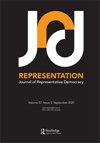政府总是在知情的情况下做出不受欢迎的决定吗?认知不准确如何影响政策决策
Q2 Social Sciences
引用次数: 0
摘要
政府偶尔未能对选民的偏好做出回应,通常被归咎于 "理性 "行为;即政府有意 "负责任 "而非 "顺应民意",将预期的政策利益置于选举目标之上。然而,有越来越多的证据表明,决策者对民意的估计能力很差,那么他们偶尔不作出反应的另一个解释会不会只是因为他们没有预料到这些决策会不受欢迎呢?在本研究中,我追溯了英国政府在三个案例中的决策过程,这三个案例中的政府都做出了在选举中代价高昂的决策,从而探讨决策者是否以及为何会误判选民的反应。我发现,主要决策者忽视了选民会因这些行动而惩罚他们的信号,往往优先考虑那些能强化其现有政策偏好的信息。研究结果支持了决策者的判断受动机推理影响的观点,并揭示了政治家未能估计民意的实际表现。本文章由计算机程序翻译,如有差异,请以英文原文为准。
Do Governments Always Take Unpopular Decisions Knowingly? How Perceptual Inaccuracy Affects Policy Decisions
Governments ’ occasional failures to respond to voters ’ preferences are usually ascribed to ‘ rational ’ behaviours; that they are knowingly being ‘ responsible ’ rather than ‘ responsive ’ , prioritising perceived policy bene fi ts over electoral goals. Yet given the increasing evidence that decision-makers are poor at estimating public opinion, could an additional explanation for their occasional failure to respond simply be that they fail to anticipate the unpopularity of such decisions? In this study, I trace the decision-making process in three cases where UK governments took electorally costly decisions to explore whether and why decision-makers misjudged voters ’ reactions. I fi nd that key decision-makers dismissed signals that voters would punish them for these actions, often prioritising information that reinforced their existing policy preferences. The results support fi ndings that decision-makers ’ judgements are compromised by motivated reasoning and shed light on how politicians ’ failure to estimate public opinion plays out in practise.
求助全文
通过发布文献求助,成功后即可免费获取论文全文。
去求助
来源期刊

Representation
Social Sciences-Sociology and Political Science
CiteScore
3.50
自引率
0.00%
发文量
31
期刊介绍:
This change in scope follows two paths. Firstly, it seeks contributors who are interested in exploring the interface between democratic practice and theory. In particular, this focus seeks contributions that apply theoretical insights to actual examples of current practice. Secondly, while not neglecting the current focus of the journal, we would like to expand its international coverage so that the journal will offer our readers insights in the state of democracy worldwide.
 求助内容:
求助内容: 应助结果提醒方式:
应助结果提醒方式:


